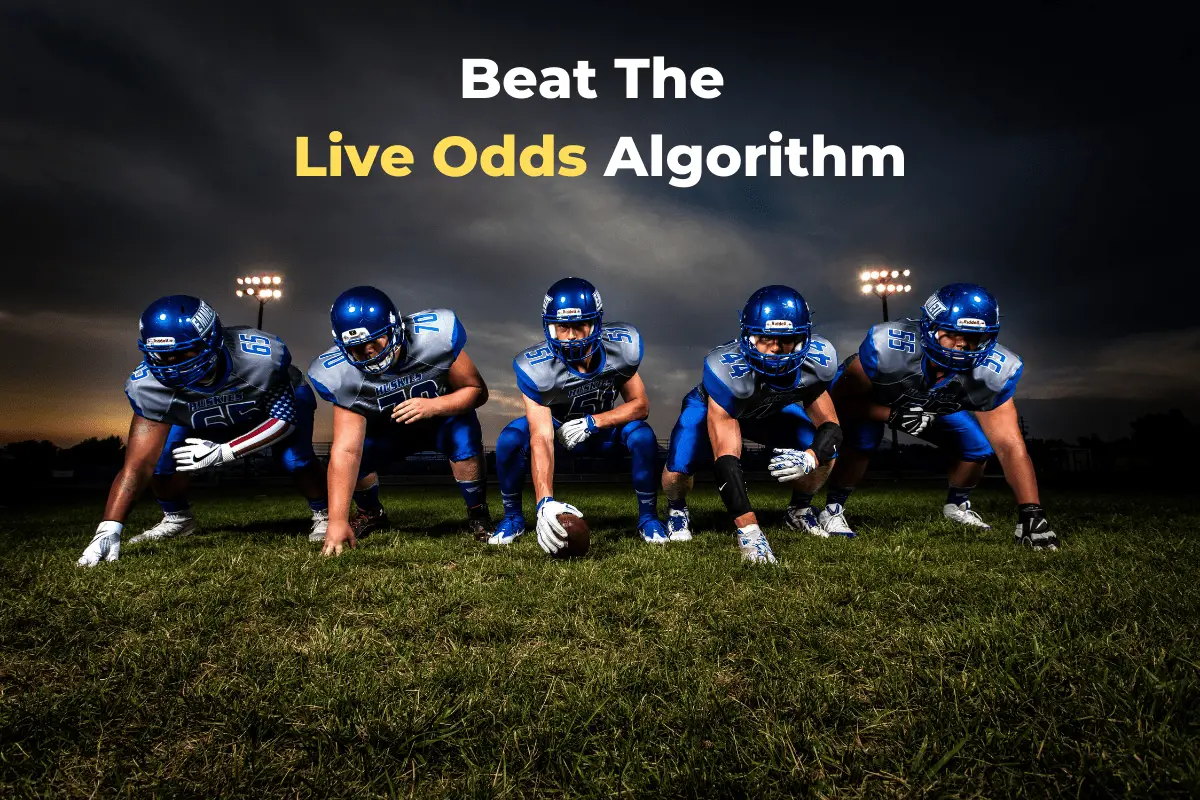There are few more exhilarating feelings than placing a live sports bet, in play, and watching it cruise home. Not only does it boost the bankroll, but the ego as well. It is a true battle of big money sportsbook versus the unheralded betting sportsfan. Who has a better read on the direction of the game? Who can predict the big play that will change the game? Who will be the hero and the villain?
Can you beat the live betting odds algorithm? The live betting odds are challenging but beatable. Sportsbooks use large data sets and a predesigned algorithm to predict live betting markets and frame odds. The bettor counters this with observation of in game nuance, subtle momentum changes and ability to foresee the human factor influence the game.
While these live sports betting algorithms are super fast, very predictive and seemingly ahead of the game, there are some strategies which make them beatable.
What Are Algorithms?
An algorithm is simply a set of rules to be followed when making calculations or completing other problem solving tasks. They are typically completed by a computer to give lightning fast compute times on exceptionally complex algorithms. For example, a simple algorithm may be used to find the area of a rectangle, a more complex one to find the amortisation schedule of your home loan and an exceptionally more complex algorithm may be used to find the atmospheric reentry angle for a spacecraft.
The fundamental use of an algorithm is that it can convert a complex data input a predictive output that can inform decisions. If the data set changes then the output will change giving helping the user to be agile in their decisions.
This is why they are a perfect fit for a sportsbook that is tracking many hundreds of live betting markets and producing up to the second accurate odds on those markets.
How Do Sportsbooks Use Algorithms to Frame Odds?
The numerous variables in the mix that can change the outcome of a sporting event make predicting the event difficult. Sportsbooks use algorithms to process in game information including scoreline, remaining game time, starting odds and in game performance statistics.
For example imagine an NFL game where Team A began the game as a 3 point favorite and half way through the second quarter were leading Team B by a touchdown. They were also quite dominant in rushing and passing yards. The live betting algorithm would use these statistics and performance measures, compare them to thousands of previous examples, and readjust the live points handicap. Perhaps now Team A, given their dominance, would be out to a 10 point favorite.
The level of sophistication of these algorithms doesn’t stop there. Continuing with our example imagine now that Team A has a 3rd and 8 on their own 25 yard line. The algorithm is able to factor in the likelihood of the team converting for a first down based on similar historic circumstances. It factors in that first down conversions are a strong indicator of converting a drive to points. The live odds reflect this likelihood. If Team A was to convert then again this would instantaneously be factored in and the odds change.
Variations of these algorithms can be used to frame odds for a whole host of different in game markets, not just point spreads and moneylines. As the technology improves the amount of markets on offer will only increase.
Could a human do these calculations? Of Course. Could they do them this quickly? Almost never.
The use of the algorithm has removed the ‘human’ factor. Emotion and bias are not part of the recipe to frame the odds. The removal of the human factor reduces risk and allows books to more confidently offer a market. In the end this should be viewed as a win for the bettor as without the algorithm technology perhaps books would simply not offer a chance to bet live.
Discover the benefits of betting with multiple sports books!
Why Are The Algos Beatable?
This is more the point for a sports bettor. We know we are up against the number crunching algorithms when we bet live. We know they are super quick and are digesting far more statistical information than we as bettor can. But are they actually able to be beaten? Yes they are.
The following are a few concrete reasons as to why employing skill, sport specific knowledge and a dash of experience, the algos are beatable.
1. Sport is More Than Just Numbers
Those of us who have spent a lifetime consuming elite level sport know, while numbers and stats are an excellent measure of a team’s performance, there is more to any game than numbers alone.
Take the NFL for example. A player like Tom Brady has dominated statistical comparisons his whole career. He has delivered championships to the New England Patriots and set a new standard in professional football. But there is something about Tom Brady that lifts him above the numbers. On the occasions that the Patriots are being beaten in statistical measures, he more often than not, somehow finds a way to win. He seizes the moment and makes a clutch play happen when historically it just doesn’t. No algorithm can account for the ‘somehows’ of sport.
The intangibles in sport do change results. Algorithms remove the human factor from the act of framing the odds, but the human factor is front and centre in every game. It is in every play. Humans do the unthinkable, inexcusable and the unbelievable all the time. Mathematical predictions will account for the ‘most of the time’ outcome but sport, as in life, remains unscripted and wildly unpredictable.
2. Struggle with Unpredictable Teams
Elite sports in the US, with the exception of the MLB, operate using a salary cap system. They all use a draft. Many international sports employ similar systems. This is all in an effort to even out competitions and keep fan interest high. What it ultimately produces are a huge proportion of inconsistent teams who win one week then get crushed the next. Form lines are hard to interpret and what seems like a bankable statistical measure one week becomes obsolete the next.
Take shooting percentage in the NBA for example. One night a team may be lights out from outside hitting threes at will. The next night, they are stone cold and can’t hit a thing. Perhaps they lose their mojo mid game and the momentum of the match swings dramatically. Algorithms working on live points spreads and points totals have an almost impossible task to do. There is a great deal of assumption at play. A definite weakness in any numbers based predictive tool.
Match ups between in consistent teams create huge challenges for oddsmakers. In turn this presents huge opportunity for bettors taking on live markets. Putting your experience and knowledge of a particular sport up against the computer generated number crunching can be profitable in these circumstances
3. Changes in Weather Changes Games
Obviously indoor sports such as the NBA and NHL are not affected by weather. The MLB tends to go into a weather delay, but the NFL and various international sports will continue through all sorts of inclement weather. For these sports, a change of weather during a game can have a large effect on the style of play and points scored. Now clearly when the weather hits it becomes obvious to all, but prior to the onset of the bad weather there is a possible delay in any marked change to odds.
It is possible to monitor weather forecasts and radar to be informed of the time of arrival of weather. The meteorologists are very accurate on these forecast now as they use extensive modelling. The live betting algorithms have conceivably not factored the weather in. Of course sportsbooks may suspend betting at any time but there is no doubt weather is worth monitoring on the off chance it may expose a weakness in the odds.
4. They Can’t Foresee Fitness Related Fade Outs
The fitness related fade out is a thing in many aerobic sports. The NBA, Soccer and hard running sports like Australian Football require elite aerobic fitness to compete till the final whistle. This is a human factor that is very difficult to quantify. What we do know is, often the team that is fitter will hit the finish line with serious momentum, while the team fading out may concede bulk points late in games.
With the onset of GPS monitoring of athletes and the data being released to the public post game, as is happening in some sports already, perhaps algorithms will be developed that factor in fitness fade outs. As it stands at the moment your observation on the condition of athletes late in games is of real value and may just beat the algos.
5. Unable to Account for In-Game Injury
Injuries are part and parcel of professional sport. As a bettor at times they can cruel your chances, on other occasions they play right into your hands. An injury to a star player can change the course of a match and while the obvious injuries are immediately accounted for by the odds makers, the niggling injury which can go unnoticed is not.
Again your observations and knowledge of a particular sport are critical here. As an example, you may detect a player looking proppy or limping and figure that this may change their effectiveness for the rest of the game. This is a point of difference to the live betting algorithm and may just be a spot that you can capitalize.
5. They Have Difficulty With Time Frames
Observing how live betting odds change reveals some of the weaknesses of the live betting algorithms. At times it is strange to watch in game odds fluctuate wildly from the pre-game odds as events occur on field. Often these fluctuations can occur early in a match when there is ample time for a team to recover from an early setback.
Referring back to our example of inconsistent teams, when one team scores early, say in the NFL. Often their odds very quickly shorten. The algorithm knows that teams scoring first historically have a much higher chance of winning and factors this in. But what if the two teams playing are both offensively minded yet struggle defensively. The team going behind early has ample opportunity to click offensively and come right back into the game. This is often the time to hit the live betting markets and catch that extra value.
6. Find it Harder to Compete with Fans Live at Venue
Fans watching on TV at home or streaming an event are actually seeing delayed footage. TV is often around 7 seconds behind and streaming can be up to 30 seconds behind real time. This creates a huge edge for the books.
Where the algorithm finds it harder to compete is with fans who are in person at venues. Take the early rounds of a grand slam tennis tournament for instance. A fan watching a match on an outside court will be able to see various ebbs and flows of a match, player fatigue, or negative body language up close and as it happens. The astute gambler can act on this fast without delay and overcome the edge the sportsbooks have.
Where Do Live Betting Algorithms Have An Edge
1. ‘Live Sport’ is Actually Delayed
As mentioned earlier in the article live sport on TV is delayed by a few seconds. Those seconds are critical for the sportsbook as they can reframe odds in an instant. Often if you are watching the live odds on your mobile app and viewing the game on TV at the same time, the odds will change before a play has been made. This creates a huge edge for the sportsbooks and a tough one to overcome
If the play represents a huge momentum shift, like a two run homer in the MLB, and a problem for the algorithm, then the sportsbook will simply suspend betting until they have recalculated. In this case betting would be suspended before the home viewer has even seen the pitch.
2. Super Fast
As we have established the speed at which the sportsbook’s computers can use the algorithm to compute huge data sets is astronomical. It is super fast and super human. Competing with that type of number crunching is not possible for the human brain. Overcoming this edge is possible by being able to spot in game nuance that the algorithm is simply unable to account for.
3. Sportsbook Juice Increase
This is less an algorithm thing and more so a sportsbook’s approach to live betting. Many of the live markets are coin flip markets. That is there are only two outcomes available, for example points totals and points spreads. Almost as an admission that framing live odds is difficult, sportsbooks will mitigate some of the risk increasing their juice.
For example often on points total markets the oddsmakers will only offer -112 or worse which increases their take. The upshot of this for the avid live bettor is that instead of having to win at 52.5% to break even they may have to win closer to 54%-55% of the time. This extra percentage point or two can (and often is) the difference between profitability and an outcome much worse. .
The Game Starts Now!
Live betting is one of the more entertaining ways to bet on sports. It provides spontaneous challenge and a roller coaster ride till the end. This area of sports betting will fast become one of the key volume earners for all sportsbooks. They will continue to invest time and dollars into developing efficient ways to frame live odds quickly and accurately.
Will they ever be able to overcome the human factor? It hasn’t happened yet in any walk of life in all of humanity!
Learn to talk like a sports betting pro. Get the complete guide to all the jargon here!



